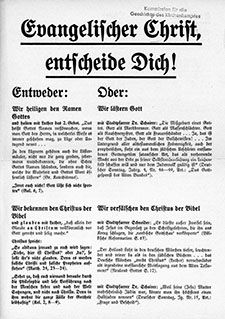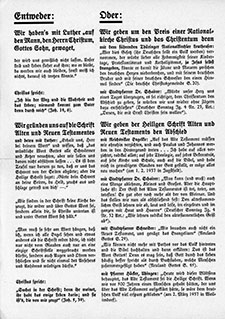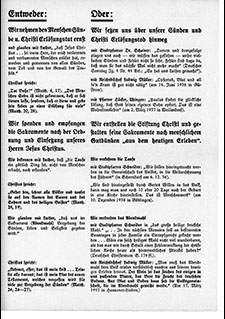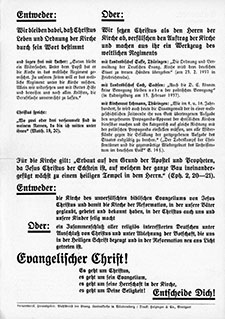Resistance against the 1937 Church Elections
On February 15, 1937, Hitler unexpectedly ordered church elections. A general synod was supposed to draw up a new constitution for the divided German Evangelical Church. Reich Minister of Church Affairs Hanns Kerrl was instructed to prepare the election.
This was supposed to create the impression that the state intended to enable the Protestant church to give itself a new order in complete freedom, a clever move of Hitler’s. Actually however, the Nazi leadership expected that the rival church factions would have a complete falling out at the general synod and ultimately put the Protestant church utterly at the mercy of the state.
Hitler’s order aroused the worst fears among church officials, except for the German Christians. The memory of the 1933 elections, which the German Christians had won overwhelmingly with the massive support of Nazi propaganda, was too fresh.
The danger was also too great that the state would push through entirely secular voting procedures and thus preprogram the election results. Confessing Church members feared they would once and for all be forced into one church together with German Christians and adherents of neopagan religions without Christian beliefs after the elections.
Faced with the prospect of the establishment of a “church” intended to serve as a propaganda unit of the Nazi state, the two wings of the Confessing Church, which had been utterly split since 1936, joined forces in an action alliance. In order to assure the election’s ecclesiastical character, it attempted to exert influence on voting procedures through numerous petitions to the Reich Ministry of Church Affairs. The petitions centered on the announcement that any election at the end of which the tenets of the church’s Christian faith would be abrogated would not meet with any acceptance from the church.
Parishes were informed about the election’s significance through handbills and rallies, at church services and informational events. According to the Security Service’s confidential situation reports, many pastors declared at their services that this was a matter of deciding between the living God or gods and idols.
Others, such as a pastor from Buckow (Märkische Schweiz), dared to criticize the elections openly as undue intervention by the state because this election, like that of July of 1933, has been imposed by the state and has nothing in common with a church election. A pastor from Welzow (Brandenburg) announced sabotage of the election in the event that the lists of candidates included such gentlemen as Reich Minister of Church Affairs Kerrl.
The complete freedom of the election proclaimed by Hitler swiftly proved to be a lie: Party officials attempted to influence the outcome of the election everywhere. The German Christians were allowed election events, the Confessing Church was not. The church press was forbidden to report on the election. The Reich Ministry of Church Affairs attempted through numerous directives to render the legal church governments of the Confessing Church’s “moderate” wing incapable of action. At the same time, the “radical” Confessing Church was beset by a wave of arrests on an unprecedented scale.
The state let nothing be known nothing about the form and date of the election for months. When rumors that the elections were imminent grew in early summer, the Old Prussian Confessing Church resolved in a statement of June 17, 1937 to call upon congregations to boycott the election on election day. A few days later, the Gestapo arrested numerous leading members of the Old Prussian Confessing Church in the Friedrichswerder Church in Berlin.
The church elections were never held. In the fall of 1937, Reich Minister of Church Affairs Kerrl placed the blame for this on the Protestant church.
Source / title
- ©Ev. Arbeitsgemeinschaft für Kirchliche Zeitgeschichte München, KK-B 368:13




